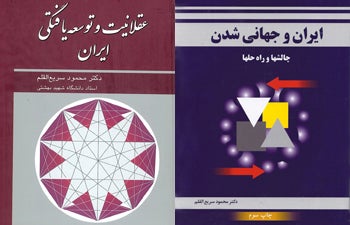Shaping Foreign Policy
A quick lesson in Farsi: Sariolghalam, literally, means “quick pen.”
Apt nomenclature for a devoted academic who has written more than 68 articles and 11 books in English, Farsi and Arabic.
Mahmood Sariolghalam, who earned his doctorate in international relations at USC Dornsife in 1987, is a scholar and specialist in Middle East politics, and Iranian foreign policy and political culture. Professor of International Relations in the School of Economics and Political Science at Shahid Beheshti University (formerly Iran National University), in Tehran, Iran, he has played an important role in shaping the theoretical foundations of the new outward-looking orientation in Iran today.
Sariolghalam recently returned from the 2014 World Economic Forum annual meeting in Davos, Switzerland, themed “The Reshaping of the World: Consequences for Society, Politics and Business.” Members gathered to develop insights and actions required to respond to current and emerging challenges related to the political, economic, social and technological forces that transform society.
While there, he participated in a Global Security Context and Nuclear Security panel, the latter at the invitation of the Netherlands’ Prime Minister Mark Rutte. In the Global Security panel, Sariolghalam offered his analysis of Iran’s domestic and foreign policy priorities, and Iran’s role in the Persian Gulf.
“As a student of Iranian politics, I think the Rouhani presidency is perhaps the only opportunity for Iranians to lift themselves economically and engage with the international community,” he asserted. “The most important contribution of this presidency is that it is ‘global-sensitive.’ And Iran’s economy is going to be a focal point over the next four years.”
Sariolghalam said the major challenge Iran faces in its foreign policy is relations with Saudi Arabia. The two countries have little connection today, and as long as compromise does not exist between them, he believes that little progress can be expected in the Middle East in terms of major issues in Iraq, Syria and Lebanon; Palestine; Persian Gulf security; and improvements in the Iranian nuclear negotiations.
“The sooner we engage Saudi Arabia, the sooner many of these issues will be resolved.”

Mahmood Sariolghalam has written more than 68 articles and 11 books in English, Farsi and Arabic. Pictured are the covers of two recent books, his seminal Rationality and Iran’s National Development and Iran and Globalization: Challenges and Solutions (both in Persian, 2010).
Sariolghalam was a graduate student at the School of International Relations from 1981 to 87, a period he calls ‘transformational.’ He remembers details right down to his favorite study cubicle in Leavey Library and the countless hours he spent there.
“The preparation for the doctoral qualifying exams was an intellectual and academic marathon. With no exaggeration, I studied for almost 18 hours a day for nine months.”
He noted James Rosenau, Jerry Bender, John Odell and Steven Lamy as the professors who most influenced his thinking and habits.
“I studied with some of the most outstanding academics worldwide in political science and international relations,” he said. “The seriousness of the program, the extent and diversity of the literature, the encouragement to attend professional conferences and the instructors’ frame of mind produced an energy, motivation and purpose in me that was beyond belief.”
When Sariolghalam left Iran in 1974 to attend University High School in Santa Monica, Calif., he promised his parents he would return home to Iran to serve his country. This he has done, having worked and taught there for 26 years, but it certainly hasn’t kept him off the international stage.
He has traveled to 114 countries and attended 534 conferences, including the annual meeting of the World Economic Forum (WEF) this year and 10 WEF-related conferences in Europe, Jordan, Egypt and Australia. He is a member of the International Studies Association (U.S.), the Global Agenda Council of the World Economic Forum (Switzerland) and is a Non-Resident Scholar at ASERI (Postgraduate School of Economics and International Relations, Italy).
His latest Farsi-language book, Iranian Authoritarianism during the Qajar Period (Farzaneruz Publications, 2012), has sold some 25,000 copies. His current research concerns the political culture of the Pahlavi era — the reigning constitutional monarchy of Iran from 1925 until the Iranian Revolution in 1979 — and a novel about post-revolutionary Iran.
Sariolghalam noted that one unique feature of American education is its emphasis on influencing policy. Through his public speaking and being an active member of the conference circuit in Iran, he has tried to draw attention to economic privatization, pluralism, civil society and international trade.
“I have cultivated much opposition, but have stood firm and determined to bring Iran back to the community of prosperous and relevant states.”
One major politician focused on such ideas is President Rouhani, elected in 2013. According to Sariolghalam, in the first five months the new president’s government has worked on changing Iran’s image, focused on opening trade and encouraged a more tolerant society.
“There are many obstacles ahead and Rouhani will confront colossal challenges, yet public support and pressures of globalization will come to his aid. I am gratified that among many Iranian academics and professionals, I also have an opportunity to serve my country’s national interests,” Sariolghalam said. “I will always remain indebted to the quality of education I received at USC.”